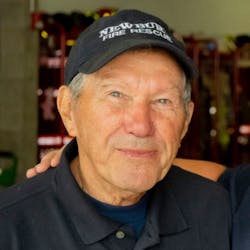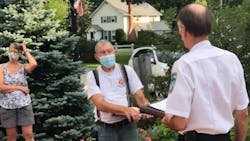NH Firefighter Retires after 75 Years: 1945 Was Different World
Ask Mike Croteau when he began his fire service career, and the New Hampshire volunteer firefighter might give you two answers.
"I joined the department when I was 16. That was the minimum age," said Croteau about when he officially became a member of Newbury Fire Rescue, where his father had been chief for 25 years.
"But I was fighting fires at probably 15, quite early in life," he added.
What's a year here or there when your career has spanned three-quarters of a century?
Earlier this month, Croteau, 90, retired from the department, and the ski resort town of around 2,000 surprised him with a socially distanced retirement ceremony. During the event, New Hampshire State Fire Marshal Paul Parisi praised Croteau's service, and proclamations were read from Gov. Chris Sununu along with U.S. Sens. Jeanne Shaheen and Maggie Hassan, and U.S. Rep. Ann McLane Kuster.
"They kept it pretty secret," said Croteau, who doesn't own a computer or have email. "The town did give me a rocking chair, which was ideal and a helluva lot better than a cane, if you will. Very enjoyable event."
Despite his firefighting pedigree, Croteau didn't expect to spend as many years as a firefighter when he started out by extinguishing brush fires ignited by the sparks from passing trains while his dad was at work in the 1940s. His enjoyment for the job never lagged.
"Time to start slowing down, right?" he jokingly said about why he finally decided to hang up his helmet. "I noticed in the last couple of years things were getting harder and harder to do. You can only push it so far and realize that you are that age, and you can't do those things."
In some ways, the COVID-19 pandemic and the uncertainty over who might be infected forced his hand. Croteau had to take himself off medical calls for the past few months because his age puts him in a high-risk group concerning the virus.
The irony is that uncertainty had always been a feature, not a bug, of firefighting for Croteau.
"One of the most interesting things about being a firefighter: You never know what's going on until you get on the scene," he said. "Every fire occurrence is different. Generally, there are no two alike. Generally, there's an expectation of what's going on, how can I combat what's going on.
"To me it was a focal point because you never knew, was it going to be a good trip or was it going to be very bad? You never knew, and I think in the back of my mind, there was always the curiosity of what was going to happen."
COVID-19 isn't the only change Croteau has seen in the fire service. Over the years, he has watched medical calls, false alarms and auto accidents account for around 80 percent of the department's calls. In fact, car crashes had been the purview of the police department when he began working.
"It was a different world back then in 1945, much different. If we had any kind of a situation, it was quite rare," said Croteau, adding that a call might only come in once a week or every other week.
When those incidents did erupt, though, they did so with a vengeance. Wildfires on Mount Sunapee, in particular, were endurance tests for firefighters.
"Forest fires were probably the biggest thing," he said. "We had one in town in 1947, '48, which was three-quarters up the mountain … and that was burning for approximately a week. That was continuous work. You had eight hours on, two hours off. It was quite demanding. But interesting.
"It was something that you really get involved in. You're not just standing around daydreaming. You're working. It was enlightening if nothing else."
Mount Sunapee has been the backdrop for less strenuous responses, too. Nowadays, firefighters are more likely to head there to find lost hikers, not battle back flames.
"Misplaced, is that what you call it?" he said with a laugh. "They have no idea what mountains are really, walking in sandals. … We do a lot of that these days, locate them and bring them out."
Listening to Croteau talk about his firefighting years is a bit like listening to a professional ballplayer finally calling it quits after an illustrious career. And like those athletes who treasure the camaraderie of the locker room above all else, Croteau knows serving with his fellow firefighters is the aspect he'll miss the most.
"I've always had a good fire department that's watched out for each other," he said. "You watch my back, and I watch yours, which is something I grew to depend on, as everyone should. It's really a close-knit outfit, and I would hope other departments are the same way."
Like just about every recent retiree, Croteau has been asked what plans he has for his free time, and he doesn't miss a beat when he replies.
"Well, traveling is out. Maybe in a couple years when traveling is back to normal."

